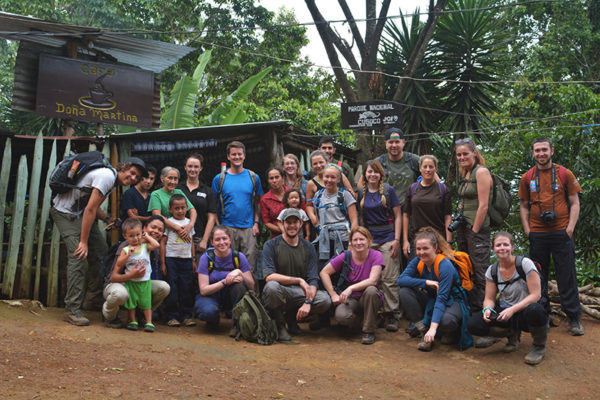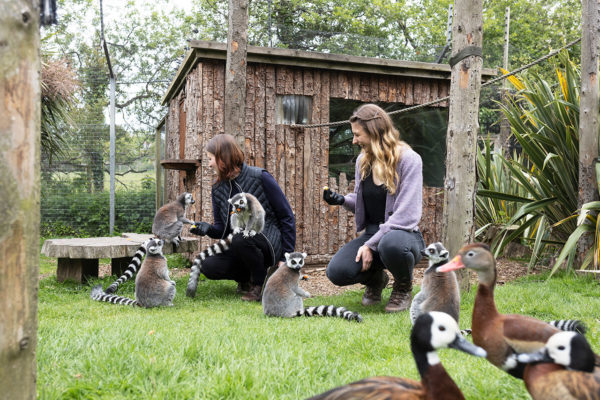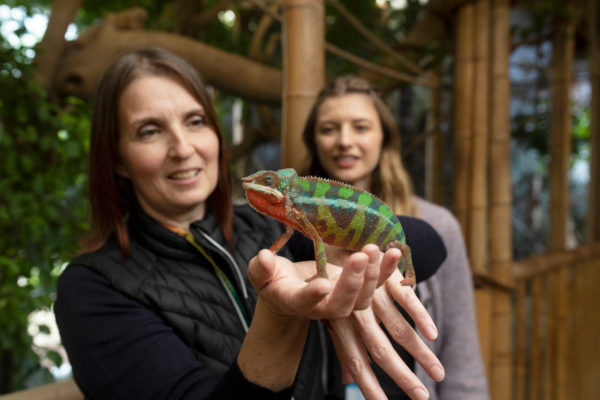MSc Conservation Project Management
Newquay University Centre Cornwall College - 23 September 2024
One year full time or two years part time
Full-time

MSc Conservation Project Management
 The first MSc programme to be designed specifically around the Open Standards for the Practice of Conservation, equipping students with the essential skills in conservation project design and management, conservation funding and communications: skills which have been identified by employers in the sector as essential, but lacking from most graduates within traditional zoology or wildlife conservation degrees.
The first MSc programme to be designed specifically around the Open Standards for the Practice of Conservation, equipping students with the essential skills in conservation project design and management, conservation funding and communications: skills which have been identified by employers in the sector as essential, but lacking from most graduates within traditional zoology or wildlife conservation degrees.
Students have full access to Conservation Career Kick-Starter course and largest online conservation job board through Conservation Careers. Working with expert instructors, students produce a professional development plan and access professional training that meets their bespoke career development needs.
A UK-based residential field course gives students the opportunity to experience field work first-hand and evaluate existing conservation projects. Alternatively, students may elect to enrol on the optional international field course module, which provides students the opportunity to gain more international conservation experience (subject to additional costs).
Face-to-face teaching will take place at the Newquay University Centre campus, situated within easy access of stunning terrestrial, coastal and marine field study sites and will make use of both long-term and newly developing partnerships and contacts with the conservation community.
The future prosperity, health and welfare of human populations is fully dependent on the continued health and functioning of ecosystems and the services they provide. This has long been recognised by conservationists, but it is, perhaps, only more recently that this delicate interdependence has become mainstream thinking. International agreements such as the United Nations Framework Convention on Climate Change (UNFCCC) and Convention on Biological Diversity (CBD) set ambitious and binding targets for governments to achieve. Meeting these targets is only possible through a multidisciplinary approach, emphasising the need for climate change, sustainability and conservation to be woven into the fabric of everything that we do moving forward. As a result, demand for graduates with an understanding of conservation issues is a rapidly growing area.
However, effective conservation requires more than just an understanding of the issues, it requires effective project management skills to ensure that limited funds are invested wisely and that outcomes are maximised. Therefore, increasingly, employers are looking for graduates with skills not always fully developed through traditional zoology, ecology and conservation degrees. These skills can be developed organically, through work experience, but getting a job without the required experience demanded by the role is difficult and often seen as a ‘catch 22’ and barrier to entering the workforce at the desired level after graduation. Similarly, those already working withing the conservation sector may not feel that they have fully developed the project management skills they need to be fully effective in their role or to progress within their chosen career path.
The MSc Conservation Project Management has been designed in recognition that employers are looking for highly skilled graduates with not only a strong understanding of environmental and conservation theory, but the ability to lead and manage projects in an effective way using industry standard approaches. The programme is underpinned by the Open Standards for the Practice of Conservation (commonly referred to as the Conservation Standards), which is an internationally agreed set of principles of best practice for managing conservation projects with a reflective and adaptive approach.
The programme has been designed in collaboration with Conservation Careers the number one careers advice centre for conservationists. In recognition that successful conservation projects need funding and public support, knowledge of fundraising, conservation marketing, communication and human behaviour change are also core elements of the programme.
Specific aims of the programme include:
• Develop an understanding of the Open Standards for the Practice of Conservation as best practice for designing and managing conservation projects.
• Develop an awareness of the main funding mechanisms for conservation
• Gain experience of effective communications for conservation projects utilising a range of strategies to engage with stakeholders and target audiences.
• Promote self-motivated and targeted professional development. Learners will identify and access bespoke training aimed at maximising their effectiveness and employability within their chosen area of the conservation sector.
• Encourage professional networking opportunities for learners and collaboration with conservation organisations through external training, assignments, field trips and completion of an independent conservation project.
• Develop critical thinking and analysis skills which can be applied to all aspects of professional conservation practice.
• Foster an ethos of reflective practice, with learners understanding its importance for the management of projects as well as their own continuous professional development.
What you will learn
Core Modules:
Conservation Standards for Project Management
Professional Development in Conservation
Conservation Funding
Communicating Conservation
Research Methods for Conservation
Optional Modules (pick one)
Conservation Field Trip (UK)
International Conservation Field Trip (additional costs apply)
On successful completion graduates should have developed:
1) Knowledge and understanding of the Open Standards for Conservation and how to apply them to managing projects
2) Knowledge of the mechanisms by which conservation funding can be obtained and an understanding of successful approaches relevant to each funding type
3) Understanding of how to communicate conservation messages effectively to different audiences
4) Techniques and methodologies for monitoring and evaluating conservation project objectives including quantitative and/or qualitative data analysis
Cognitive and intellectual skills:
1) The ability to understand complex relationships through systems thinking, to identify appropriate conservation targets and critically evaluate the threats and contributing factors in order to design effective theory of change strategies.
2) The ability to demonstrate initiative and originality in problem solving, acting independently to plan and implement a project which addresses an identified conservation need.
3) Critical thinking skills which enable the views of a range of stakeholders to be considered in a fair and unbiased manner during stakeholder communication and negotiation.
Key and transferable skills:
1) Source information effectively using a full range of learning resources.
2) Collate, analyse and interpret data in quantitative and qualitative forms independently and with minimum guidance.
3) Use appropriate information technology, including word-processing, graphics, spreadsheets, presentation packages and specialist statistics programmes.
4) Write engaging copy for the clear and effective communication of key messages to different audiences.
Employment related skills:
1) Effective adaptive project management skills, including the ability to set clear and measurable objectives which are monitored and evaluated regularly to apply an adaptive management approach.
2) Recognition of their own strengths as well as the importance of continued professional development and regular reflection and planning.
3) Ability to communicate effectively using written, verbal and visual media
4) Experience of working as part of a team to deliver project objectives within an agreed deadline
Practical skills:
1) Grant proposal writing and crowdfunding campaign management experience
2) Communication skills - production of effective and engaging communications based on a communications plan
3) Survey techniques and data analysis skills
INDICATIVE MODULES - YEAR 1
• Conservation Standards for Project Management
• Professional Development in Conservation
• Conservation Funding
• Communicating Conservation
• Research Methods for Conservation
• Conservation Field Trip (UK) or International Conservation Field Trip
Entry requirements
All applicants must have a relevant level-6 BSc (Hons) qualification (or equivalent) at 2.2 classification or higher. Applicants falling below this level but who have significant industry experience may also be considered on an individual basis.
Work experience
Face-to-face teaching will take place at the Newquay University Centre campus, situated within easy access of stunning terrestrial, coastal and marine field study sites and will make use of both long-term and newly developing partnerships and contacts with the conservation community
Assessment
Assessment is aligned to the University of Plymouth Assessment Policy and designed to be a valid, reliable and practical assessment of knowledge and understanding, critical thinking and professional attributes – with the intention to support the development of reflective, life-long learners who are able to assess their own performance.
Content and modules are sequenced so that students can put into practice knowledge and skills which they have learnt earlier in the programme in subsequent modules and assessments. For example, students will learn the principles of designing a conservation project using the Conservation Standards during the first semester. They will then apply this knowledge to design their own conservation project and reflect and communicate on this in their final MSc project report.
Students will be encouraged to reflect on their own professional development as well as the outcomes of the projects they deliver during the course. This will be achieved by including reflective essay elements as well as traditional and multimedia reports.
Progression
Students will complete a professional development plan at the start of the course to identify their ideal career trajectory, next steps in that progression (after completing the course) and specific skills they need to develop/enhance during the course. Students will then be supported in identifying and accessing additional training which they will undertake in parallel to the delivered programme.
Each student will have access to a personal training grant to be spent (in agreement with their tutor/programme lead) on suitable training which will help them fulfil their PDP. All students will have access to the Conservation Careers job site and online community for help accessing jobs and structuring their CV and applications.

Newquay University Centre Cornwall College
Newquay University Centre Cornwall College is a small but vibrant campus specialising in university level courses focussing on the environment. For over 20 years, we have inspired hundreds of students to make that all-important difference, using their passion as a guide. Our dedicated higher education campus is home to the marine science, zoology and surf stars of the future.
Championing #generationrestoration, this campus may be small, but its students and staff have a big impact on our planet and its future wellbeing. Likeminded individuals come together to undertake international, award-winning research, meaning when their incredible time at Newquay is done, they move onto fantastic and important careers.
It’s why you should definitely consider Newquay University Centre Cornwall College for your #careercollege experience.
Conservation Standards for Project Management
Professional Development in Conservation
Conservation Funding
Communicating Conservation
Research Methods for Conservation
Optional Modules (pick one)
Conservation Field Trip (UK)
International Conservation Field Trip (additional costs apply)
On successful completion graduates should have developed:
1) Knowledge and understanding of the Open Standards for Conservation and how to apply them to managing projects
2) Knowledge of the mechanisms by which conservation funding can be obtained and an understanding of successful approaches relevant to each funding type
3) Understanding of how to communicate conservation messages effectively to different audiences
4) Techniques and methodologies for monitoring and evaluating conservation project objectives including quantitative and/or qualitative data analysis
Cognitive and intellectual skills:
1) The ability to understand complex relationships through systems thinking, to identify appropriate conservation targets and critically evaluate the threats and contributing factors in order to design effective theory of change strategies.
2) The ability to demonstrate initiative and originality in problem solving, acting independently to plan and implement a project which addresses an identified conservation need.
3) Critical thinking skills which enable the views of a range of stakeholders to be considered in a fair and unbiased manner during stakeholder communication and negotiation.
Key and transferable skills:
1) Source information effectively using a full range of learning resources.
2) Collate, analyse and interpret data in quantitative and qualitative forms independently and with minimum guidance.
3) Use appropriate information technology, including word-processing, graphics, spreadsheets, presentation packages and specialist statistics programmes.
4) Write engaging copy for the clear and effective communication of key messages to different audiences.
Employment related skills:
1) Effective adaptive project management skills, including the ability to set clear and measurable objectives which are monitored and evaluated regularly to apply an adaptive management approach.
2) Recognition of their own strengths as well as the importance of continued professional development and regular reflection and planning.
3) Ability to communicate effectively using written, verbal and visual media
4) Experience of working as part of a team to deliver project objectives within an agreed deadline
Practical skills:
1) Grant proposal writing and crowdfunding campaign management experience
2) Communication skills - production of effective and engaging communications based on a communications plan
3) Survey techniques and data analysis skills
INDICATIVE MODULES - YEAR 1
• Conservation Standards for Project Management
• Professional Development in Conservation
• Conservation Funding
• Communicating Conservation
• Research Methods for Conservation
• Conservation Field Trip (UK) or International Conservation Field Trip

Newquay University Centre Cornwall College
Newquay University Centre Cornwall College is a small but vibrant campus specialising in university level courses focussing on the environment. For over 20 years, we have inspired hundreds of students to make that all-important difference, using their passion as a guide. Our dedicated higher education campus is home to the marine science, zoology and surf stars of the future.
Championing #generationrestoration, this campus may be small, but its students and staff have a big impact on our planet and its future wellbeing. Likeminded individuals come together to undertake international, award-winning research, meaning when their incredible time at Newquay is done, they move onto fantastic and important careers.
It’s why you should definitely consider Newquay University Centre Cornwall College for your #careercollege experience.
Related Topics

Dates & Locations
- Location - Newquay University Centre Cornwall College
- Start Date - 23 September 2024
- Tuition Fees: £11500.00*
*Please note - Fees apply to adults and HE students only. Only the most common fees scenario is shown. Actual fees may vary depending on your personal situation. Please contact us for further information.
MORE INFORMATION ON FINANCIAL SUPPORT
Information for ages 19+ -
Apply Now
For 23 September 2024 start date
In partnership with

Course Code 12081-NQY-24
Courses listed on this website are indicative of the subject, nature and level of study. The College reserves the right to alter specific qualifications titles, awarding bodies and levels of qualification, which can change in year. Any cost may also vary, based on personal funding eligibility. The Cornwall College Group reserves the right to withdraw any course listed at any time.
Cornwall College Career Dashboard
Why choose a career in Wildlife Conservation & Zoology?
#thecareercollegeVeterinary Research Officer
£Average salary
Veterinary Research Officer





